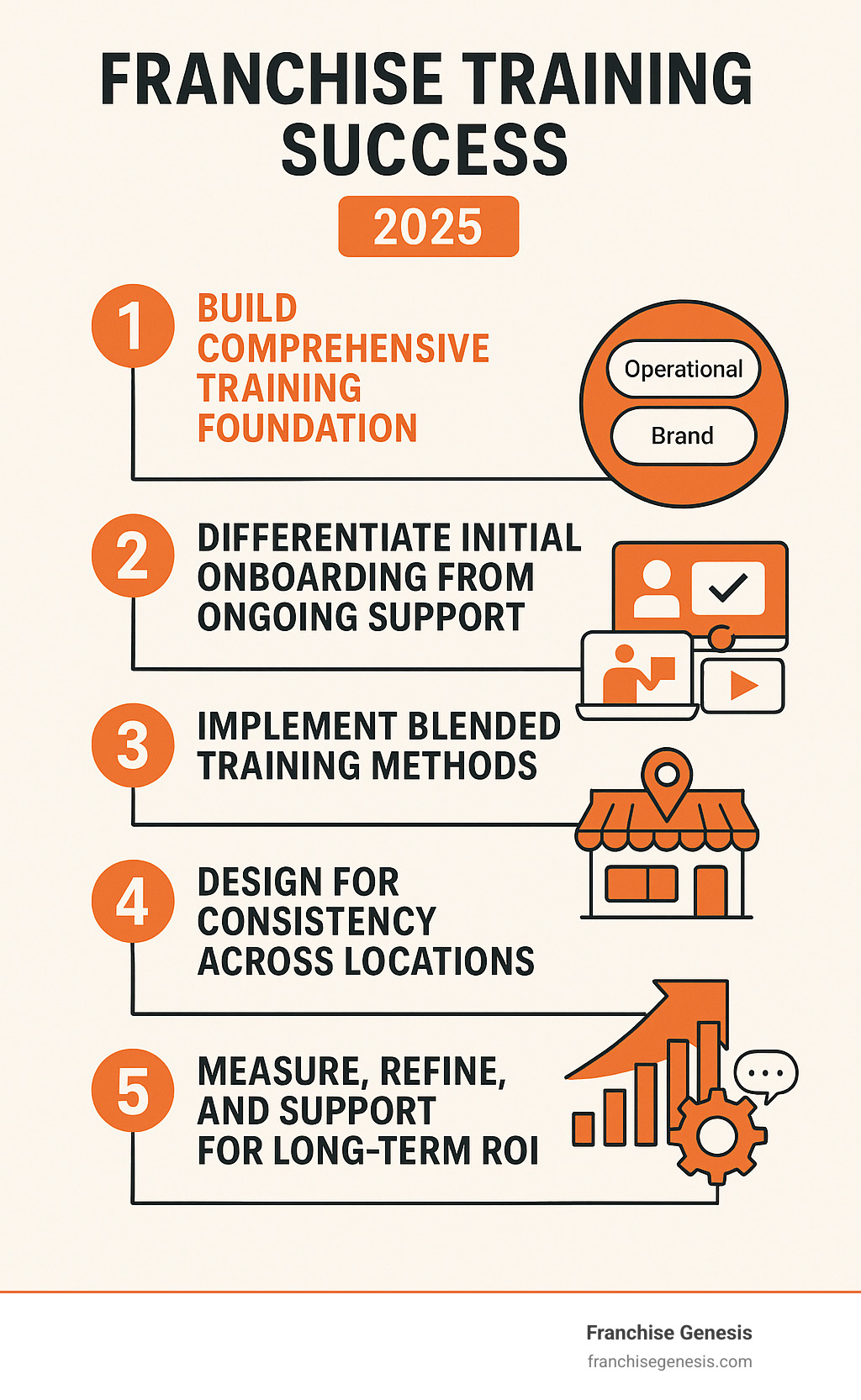Why Franchise Training Success Determines Your Brand’s Future
Franchise training success is the foundation of a thriving franchise system, separating it from those that struggle with inconsistency and unhappy franchisees. When expanding your business, your training program’s quality determines if franchisees can replicate your success or become a liability to your brand.
Key Elements of Franchise Training Success:
- Comprehensive initial training covering operations, brand standards, and business management
- Ongoing support systems that adapt to market changes and reinforce standards
- Multiple training methods including hands-on, classroom, and technology-based learning
- Consistent implementation across all locations to maintain brand integrity
- Performance measurement to ensure ROI and continuous improvement
When franchise training falls short, the consequences are severe: 40% of new hires leave within their first year, often because they lack adequate training. Poor training damages your brand reputation and hinders future franchise sales.
The most successful franchise systems treat training as an ongoing investment, not a one-time expense. Data proves robust training directly impacts your bottom line: companies that spend $1,500 or more on employee development see 24% higher profits than those that spend less.
As Monique Pelle-Kunkle, Vice President of Operations at Franchise Genesis, I’ve scaled franchise systems to over 100 units. My experience shows that the right training foundation is the difference between explosive growth and costly failure.

Step 1: Build a Comprehensive Training Foundation

A successful training program needs a strong foundation. It must go beyond basic operations to instill your brand’s culture and values. This initial phase transforms an investor into a brand ambassador and capable operator, ensuring they understand not just what to do, but why they do it.
The Core Components for Franchise Training Success
Think of your training program like building a house; the foundation must be solid. This means covering every essential aspect of running your business.
- Operational Training: This covers the nuts and bolts: daily procedures from opening to closing, inventory, and service delivery. Your Franchise Operations Manual is the cornerstone, a detailed playbook for ensuring consistency and efficiency.
- Brand & Culture Training: This instills your brand’s ethos—its mission, values, and unique customer experience. It’s about creating an emotional connection that ensures every interaction reflects your core identity.
- Sales & Marketing Systems: Franchisees must learn to attract and retain customers. This training covers your proven sales methods, lead generation, local marketing, and using provided collateral. We teach them to grow the business, not just open it.
- Financial Literacy Training: Franchisees need to understand your specific unit economics, KPIs, and financial reporting. Since businesses with robust financial planning are 30% more likely to grow, this training is vital for helping them make informed decisions and maximize profitability.
As our VP of Operations, Monique Pelle-Kunkle, says, “We’re not just selling franchises; we’re building a network of successful entrepreneurs passionate about our brand.”
The Critical Role of Soft Skills Training
While technical skills are crucial, soft skills are equally important. They impact everything from customer satisfaction to employee retention.
- Customer Service Excellence: Customers expect consistent, high-quality service at every location. Training staff on customer service excellence builds loyalty and drives profitability. Increasing customer retention by just 5% can boost profits by 25% to 95%.
- Team Management & Leadership: Franchisees must be effective leaders. They need to hire the right people, inspire their teams, and create a positive work environment. Training should cover leadership styles and coaching, as empathy is a key driver of performance, with 84% of CEOs highlighting its importance.
- Effective Communication: Clear communication is vital for team collaboration, customer trust, and the franchisor-franchisee relationship. It helps align everyone with brand standards and resolve issues effectively.
- Conflict Resolution: Challenges are inevitable. Training franchisees in conflict resolution—handling customer complaints and employee disputes—is crucial for maintaining a positive brand image and smooth operations.
Investing in soft skills and providing train-the-trainer tools builds a more capable, adaptable, and customer-focused network.
Step 2: Differentiate Between Initial Onboarding and Ongoing Support
Think of franchise training success like learning to drive: initial training provides the license, but ongoing support creates a skilled driver. A common mistake is front-loading all training and then leaving franchisees alone.
Initial training is a sprint to opening day; ongoing support is the marathon for lasting success. The best franchise systems treat training as a continuous cycle of learning and adaptation.
Mastering the Initial Training Phase
The initial training phase is changeal, turning an investor into a capable operator. This foundational training must be comprehensive, covering operations, marketing, sales, finance, and HR. There can be no gaps before opening day.
- Hands-on, in-person experience is irreplaceable. While online modules are great for theory, nothing beats practicing in a real environment, like at corporate headquarters or shadowing a successful franchisee. A blend of virtual and hands-on training is ideal.
- Classroom learning provides the theoretical foundation, explaining your brand philosophy, business principles, and the “why” behind your methods. It connects the dots between marketing, finance, and operations.
- Clear expectations on brand standards, procedures, and reporting must be set during this period. Early transparency builds trust and prevents future issues.
- Crucially, you’re transitioning investors into operators, teaching them to apply their skills within your specific system. This intensive training typically lasts one to four weeks.
Why Ongoing Training is Your Lifeline for Growth
Opening day is the starting line, not the finish. True franchise training success requires continuous investment in the long-term partnership with your franchisees.
- Adapting to market changes is crucial. The market constantly evolves with new technologies and shifting consumer preferences. Ongoing training ensures your entire network stays current and competitive.
- Introducing new products and services requires targeted training on product knowledge, marketing, and operations to keep the entire network aligned and moving forward together.
- Reinforcing brand standards through regular workshops and refresher courses prevents “operational drift”—the gradual erosion of standards. This reinforces core values and keeps everyone aligned.
- Building a strong franchisee community happens through ongoing training events like webinars and conventions. These gatherings allow for networking and sharing best practices, which is essential for success. Explore effective Franchise Growth Strategies to support your network.
Ongoing support should also include access to field consultants and regular check-ins. The best franchisors view this as a partnership where everyone’s success is interconnected. This continuous investment improves franchisee satisfaction and retention, turning them into your best advocates for future growth.
Step 3: Implement Effective, Blended Training Methods

Franchisees have diverse learning styles, so a one-size-fits-all training approach is ineffective. Franchise training success depends on a blended approach that caters to different needs, improving knowledge retention, engagement, and scalability. Technology is essential for flexible training, but it should improve, not replace, human connection.
Combining In-Person, Hands-On, and On-Site Training
It’s like learning to drive: you need classroom theory, but you also need hands-on practice in real-world conditions.
- Corporate headquarters training provides a crucial foundation in a focused environment. Franchisees learn procedures, meet the corporate team, and absorb the brand culture.
- On-the-job shadowing bridges the gap between theory and practice. New franchisees observe successful operators handle real-world challenges, which is invaluable.
- In-unit launch support provides a critical safety net during the first weeks. Having your team on-site builds franchisee confidence as they train staff and serve their first customers.
- Real-world role-playing and simulations let franchisees practice handling sales, complaints, or conflicts in a safe, low-risk environment. This builds confidence and muscle memory for real-world challenges.
- Case studies from successful franchisees provide inspiration and practical wisdom. Hearing how peers overcame challenges makes success feel more achievable.
Leveraging Technology to Improve Training Effectiveness
Technology transforms training into an ongoing, accessible resource. The key is using it to improve human connection.
- A Learning Management System (LMS) acts as a central hub for franchisees to access modules, track progress, and find documents. It ensures consistency and structure across the network.
- On-demand video tutorials break down complex procedures into short, focused videos. Franchisees can use these for initial learning, quick reviews, or training their own staff.
- Virtual Reality (VR) is a practical tool for risk-free procedural training. Franchisees can practice managing a busy shift or handling equipment maintenance in a virtual environment, building confidence before facing real situations.
- Mobile learning apps provide just-in-time support. Franchisees can quickly find procedures or troubleshoot issues on their mobile devices, getting instant answers.
Interactive tools like gamification and simulations make training more engaging and improve information retention. Emerging technologies are changing franchisee training, and staying current gives your franchisees an advantage. The most successful systems blend high-tech and high-touch training seamlessly, offering the convenience of technology alongside the support of real people.
Step 4: Design for Consistency to Achieve Franchise Training Success

The magic of franchising is consistency. A customer in Miami should have the same exceptional experience as one in Seattle. It’s about a seamless brand experience that builds trust and loyalty. Your training program is the guardian of this consistency. Without it, you risk brand confusion and customer disappointment from varied experiences across locations.
Ensuring a Consistent Customer Experience Across All Locations
Consistency is your brand’s superpower, changing a single business into a trusted franchise system. Every part of the customer journey must be reliable and familiar.
- Standardized operational procedures form the backbone of consistency. Documenting every step, from customer greeting to problem resolution, isn’t micromanagement; it’s precision. Training must cover all these standardized procedures.
- Uniform brand voice and service protocols ensure your brand’s personality is consistent. Training must translate your brand voice—whether it’s friendly or formal—into specific, replicable behaviors for all team members.
- Quality control checklists are practical tools that help franchisees maintain standards. Simple, visual checklists for daily operations, cleanliness, and quality empower franchisees to self-monitor and uphold high standards.
The Harvard Business Review emphasizes that retaining customers through a consistent, positive experience is key to profitability.
Overcoming Common Challenges in Training Implementation
Even the best training programs face implementation challenges. The key is to anticipate these common, solvable obstacles and build solutions into your approach.
- Gaining franchisee buy-in requires showing, not telling. Franchisees are entrepreneurs who invested in a proven system, not micromanagement. Demonstrate how following standards boosts their profitability and efficiency using data and success stories from other franchisees.
- Accommodating time constraints is a practical necessity. New franchisees are busy. A blended learning approach respects their time by using online modules for foundational knowledge and reserving in-person time for critical, hands-on skills.
- Providing centralized support tools is crucial. A well-organized learning management system with searchable manuals, videos, and FAQs empowers franchisees to find answers instantly, anytime.
- Fostering a continuous learning culture turns training into a competitive advantage. Create a community where franchisees share insights and learn from each other. This peer-to-peer learning reinforces training and strengthens the entire network.
A strong training program is also a powerful sales tool. Showcasing your robust training and support gives potential franchisees the confidence to invest in your system, which is a key part of Effective Franchise Sales & Marketing.
Step 5: Measure, Refine, and Support for Long-Term ROI
A training program isn’t a “set it and forget it” initiative. To ensure it delivers a strong return on investment, you must continuously measure its impact, gather feedback, and refine your approach. Connecting training to franchisee performance proves its value and justifies investment. This final step is crucial for sustained franchise training success, with top franchisors using measurement as a compass for continuous improvement.
How to Evaluate the Quality and Effectiveness of Your Program
To understand what’s working, use a multi-faceted approach to measure training effectiveness, combining hard data with qualitative feedback.
- Franchisee Performance KPIs: Track KPIs like sales growth, profitability, and operational efficiency. Comparing these metrics between highly engaged and less engaged franchisees provides direct evidence of your training’s impact.
- Customer Satisfaction (CSAT) Scores: These reveal how training impacts the customer experience. Higher CSAT scores related to service and quality often correlate directly with well-trained staff.
- Compliance Audits & Field Reports: Regular field consultant visits and audits provide on-the-ground insights, assessing adherence to brand standards and providing tangible data on how well training is being implemented.
- Anonymous Franchisee Feedback Surveys: Use anonymous surveys to gather direct franchisee feedback on training content, delivery, and usefulness. This qualitative data is invaluable for refining the program.
- Peer Review Sessions: Facilitate discussions where franchisees can critique training and suggest improvements. This collaborative feedback loop fosters ownership and keeps the program relevant.
Measuring ROI for Long-Term Franchise Training Success
Training is an investment that should yield measurable returns. Demonstrating this ROI justifies the resources and encourages ongoing commitment.
- Increased Unit Profitability: This is the most direct measure of success. Effective training improves operational efficiency, sales, and customer satisfaction, boosting the bottom line.
- Higher Employee Retention Rates: Good training improves job satisfaction and reduces costly turnover. Without it, 40% of new hires may leave within their first year.
- Reduced Franchisee Support Costs: Well-trained, self-sufficient franchisees require less hand-holding, allowing your support team to focus on strategic growth instead of firefighting.
- Faster New Unit Ramp-Up Time: An effective program shortens the learning curve, helping new units become profitable faster, which benefits the entire network.
- Improved Brand Reputation and Value: A consistent, high-quality experience builds brand trust, making your franchise more attractive to prospective buyers and fueling growth.
A franchisor’s investment in training is a direct investment in your own success. It’s a strategic decision that pays dividends across your entire system.
Frequently Asked Questions about Franchise Training
Here are common questions business owners have when planning their franchise training success strategy.
How long should our initial franchise training program be?
The ideal length is typically one to four weeks, depending on your business’s complexity. A simple retail concept may only need one week, while a technical service business could require a month or more.
The key is to balance thoroughness with practicality. A good program blends classroom theory (about 40%) with hands-on practice (60%). The goal is competence, not speed. A franchisee who opens strong will always outperform one who opens quickly but unprepared.
Who from the franchisee’s team should we train?
At a minimum, train the primary franchisee (Operating Principal) and their general manager. They are your on-the-ground brand ambassadors responsible for daily operational excellence.
For scalability, implement a “train-the-trainer” program. It’s logistically and financially impossible for you to train every employee in your network. Instead, empower your franchisees to do it by providing them with scripts, videos, and guides. This creates a multiplier effect, allowing one franchisee to train dozens of employees, ensuring consistency at scale.
How do we ensure franchisees actually implement the training?
This requires ongoing support and a clear demonstration of value. Show entrepreneurial franchisees how following the system improves their bottom line, and they will be more likely to comply.
- Regular, supportive field visits from business coaches are essential. These coaching check-ins show you’re invested in their success, encouraging them to follow your guidance.
- Consistently monitor key performance indicators (KPIs) like sales, customer satisfaction, and profit margins. This data helps you identify struggling units early and provide targeted support.
- Use compliance audits and performance reviews to reinforce standards. Frame them as partnership discussions focused on improvement, not enforcement.
- Maintain open communication. Encourage questions and feedback, and consistently link system adherence to profitability. When franchisees see the benefits, implementation becomes a natural choice.
You’re building long-term partnerships, not just selling licenses. Franchise training success depends on creating an environment where franchisees want to follow your systems because they see the value.
Conclusion
Building a successful franchise network isn’t about the first sale; it’s about creating a system that can replicate excellence at every location, strengthening your brand with each new unit.
Following these five strategic steps—building a comprehensive foundation, differentiating initial and ongoing support, using blended training methods, designing for consistency, and measuring for ROI—creates a powerful engine for franchisee success that protects your brand legacy.
Every dollar invested in training is an investment in your own growth. When franchisees succeed, the system thrives. When they struggle due to poor training, it hurts your brand and hinders expansion.
Successful franchisors know that franchise training success is an ongoing commitment. The quality of your program can determine whether your concept becomes a thriving system or a cautionary tale.
Your training program bridges your vision with the reality of a multi-unit operation. It transforms investors into passionate brand ambassadors who can deliver your signature customer experience.
At Franchise Genesis, we’ve seen how the right training foundation prevents costly setbacks and fuels growth. We specialize in building scalable systems that become the cornerstone of your brand’s expansion. Ready to turn your business into a successful franchise? Explore our comprehensive services for franchisors and franchisees to learn how we can help you build a world-class training program.
